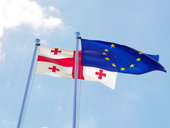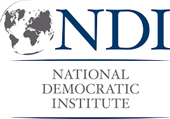
NDI polls reveal 77% of Georgians would like to join the EU, 74% NATO
By Gvantsa Gabekhadze
Tuesday, May 21
The Georgian office of the American National Democratic Institute (NDI) says that the larger number of Georgians want to see the country in the EU and NATO. However, many of them believe that the country is not ready for membership.
A total of 77 percent of 2,927 surveyed people around Georgia (excluding the Russian-occupied Abkhazia and Tskhinvali regions) approve joining the EU, with 56 percent strongly approving.
“If the country held a referendum on membership tomorrow, 68 percent would vote for and only 14 percent against,” the NDI Georgia reported on Monday.
Those who support EU membership identify economic growth, security, and jobs as the primary reasons for their approval.
Of the 13 percent who disapprove the EU membership, 39 percent cite conflict with Russia, 31 percent the desire for closer ties with Russia, and 19 percent the belief that the EU threatens Georgian culture as the top three reasons for disapproval.
“41 percent of all Georgians, regardless of position on EU membership, believe the EU threatens Georgian values. A majority of Georgians also believes that joining the EU would benefit many groups in the country, including farmers, students, persons who are unemployed, and ethnic, religious, and sexual minorities, and improve the quality of education, affordability of healthcare, and Georgia’s security, among other issues,” the survey reads.
Support for NATO membership also stands steadily at 74 percent, with 55 percent of citizens strongly approving membership.
“However, in Armenian settlements, half (49 percent) the population disapproves of membership, and only 28 percent approves the EU. While support for NATO membership is also low in Azeri settlements, it is not due to disapproval but rather very high ‘don’t know’ responses, at 41 percent,” the survey says.
A majority of Georgians believes Russia is the biggest security threat to the country, with 31 percent naming Russian military aggression, 11 percent occupation, and 10 percent Russian propaganda.
“This was less true, however, in Armenian and Azerbaijani settlements, where only three percent and eight percent, respectively, view Russian military aggression as a threat. Pluralities also believe Russia harms the economy (43 percent), politics (45 percent), and security (47 percent),” NDI Georgia says.
Despite support for membership, according to the polls, the majority of Georgians does not believe the country is ready for EU membership (59 percent) or NATO membership (55 percent).
The factors holding Georgia back from EU membership are territorial conflicts (36 percent), Russia (20 percent), and lack of democracy (15 percent).
Similar reasons were given for delays in NATO membership. Respondents listed the occupied territories (42 percent), Russia (47 percent), and lack of democracy (12 percent).
“While EU support is still very strong in Georgia, it’s important to be mindful of the widespread belief that the Union poses a threat to Georgian culture and values. Those who want to deepen domestic support for the EU need to explain membership and its goals better,” said Laura Thornton, NDI Global Associate.
“About NATO, it is interesting to learn how differently this issue is perceived in Armenian and Azerbaijani settlements. While Armenians actively disapprove of membership, people in Azerbaijani settlements lack adequate information. Different approaches are therefore required when communicating in these areas, and more needs to be done to reach Azerbaijani communities,” she stated.
The polls were financed by the UK government and carried out by the CRRC Georgia.


